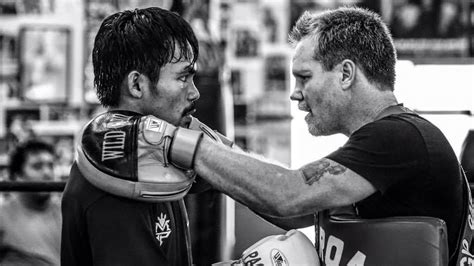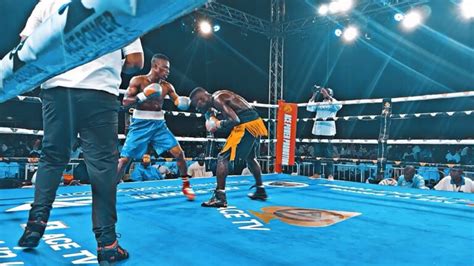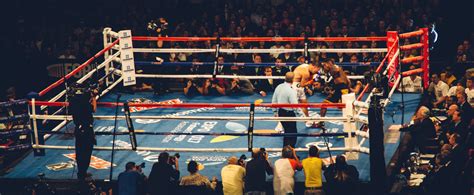Explore the pivotal role of influential boxing coaches and their transformative methods in shaping fighters’ careers and mentalities throughout history.Boxing has long been celebrated as a formidable sport marked by individual talent and tenacity, but behind every champion lies a coach whose influence can be just as powerful. In “Influential Boxing Coaches Who Changed the Game,” we journey through the lives and legacies of the trainers who have not only shaped the careers of iconic fighters but also revolutionized training methodologies and strategies within the sport. From innovative coaching styles to instilling a winning mentality, these coaches have made indelible marks on boxing history. Join us as we explore how their insights and techniques have transformed athletes and the sport itself, ensuring their influence continues to resonate within the squared circle today.
The Role of Coaches in Shaping Boxing Careers
In the highly competitive world of boxing, influential boxing coaches play a crucial role in the development and success of fighters. From their expertise in training techniques to the psychological support they provide, coaches are essential in shaping both the physical and mental attributes of a boxer.
Coaches not only impart technical skills but also help fighters craft their personal styles, enabling them to perform optimally in the ring. A great coach identifies the strengths and weaknesses of their athlete, tailoring training regimens to enhance performance while mitigating vulnerabilities. This personalized approach ensures that fighters can adapt to various styles and opponents, a vital aspect of their success.
Moreover, the relationship between a coach and a boxer goes beyond just training routines; it often embodies trust, respect, and loyalty. Coaches serve as mentors and advisors, guiding their athletes through the rigors of competition and the emotional challenges that come with it. This mentorship is essential for developing a boxer’s mental toughness, a characteristic that can frequently determine the outcome of a match.
As we delve deeper into the legacy and methodologies of various influential boxing coaches, it becomes clear that their impact extends far beyond the gym, influencing entire generations of fighters and the evolution of the sport itself.
Influential Boxing Coaches Who Revolutionized Training Methods
The landscape of boxing has been profoundly altered by the innovative techniques and methodologies introduced by influential boxing coaches. Their contributions not only helped shape the athletes they trained but also set new standards for the sport itself. Here are some notable coaches known for their revolutionary training methods:
- Angelo Dundee – Renowned for his work with Muhammad Ali and Sugar Ray Leonard, Dundee emphasized the importance of strategy and mental preparation, integrating psychological elements into training.
- Freddie Roach – With his adaptive striking drills and focus on the importance of footwork, Roach has transformed the way fighters approach the ring, advocating for a combination of traditional and modern training techniques.
- Customato – By introducing the peek-a-boo style and incorporating intense conditioning regimes, Customato changed the way fighters trained for speed and agility, critically impacting the careers of boxers like Mike Tyson.
- Bill Miller – Known for his analytical approach, Miller utilized video analysis and feedback to refine technique, setting the stage for how fighters are coached in contemporary training environments.
These influential boxing coaches have demonstrated that the right training philosophy and innovative methods can not only elevate a fighter’s performance but also leave a lasting mark on the entire sport.
Iconic Coaching Styles That Transformed Fighters
Throughout boxing history, influential boxing coaches have employed distinctive coaching styles that have not only shaped individual fighters but also altered the entire landscape of the sport. These unique approaches often reflect the coach’s personality and vision, leading to signature methods that yield remarkable results. Here, we explore some of the most iconic coaching styles that have significantly launched the careers of champions.
1. The Drill Sergeant Approach
Some of the most famous coaches, like Angelo Dundee, embodied a commanding presence in the gym. They pushed their fighters through grueling training sessions, instilling discipline and resilience. Their assertive leadership helped mold mentally tough champions who could withstand the pressures of the ring.
2. The Mentor Method
On the opposite end of the spectrum, coaches like Freddie Roach adopted a more nurturing approach. They focus on building a personal rapport with fighters, offering support and encouragement throughout their journey. This style emphasizes trust and emotional safety, allowing fighters to thrive under pressure.
3. The Analytic Strategist
Coaches such as Eddy Reynoso illustrate the importance of a strategic mind in boxing. They analyze opponents meticulously, designing tailored game plans that exploit weaknesses. This method not only teaches fighters to think critically about their approach but also empowers them to adapt mid-fight.
4. Holistic Training Advocates
Other influential boxing coaches like Teddy Atlas embrace a holistic training philosophy, integrating physical, mental, and emotional training into their regimen. They emphasize the importance of mental conditioning alongside physical fitness, ultimately shaping well-rounded athletes capable of dealing with various challenges both inside and outside the ring.
The diverse coaching styles of influential boxing coaches have played a pivotal role in transforming how fighters train and compete. Each approach not only influences the fighter’s development but also leaves a lasting impact on the sport itself, paving the way for future generations of boxers. Their legacies continue to inspire both current and aspiring coaches and athletes worldwide.
How Influential Boxing Coaches Build Winning Mentalities
The journey of a boxer is not just defined by their physical prowess, but also by the mental resilience that comes from effective coaching. Influential boxing coaches play a crucial role in developing the mindset of their fighters. Here are some key strategies employed by these coaches to instill a winning mentality:
| Strategy | Description |
|---|---|
| Visualization Techniques | Coaches often guide fighters in using visualization to mentally prepare for their matches, allowing them to envision success and overcome obstacles. |
| Positive Reinforcement | By celebrating small victories and improvements, coaches help build confidence and self-belief in their boxers. |
| Goal Setting | Establishing realistic, achievable goals gives boxers a clear focus, fostering a sense of purpose and motivation. |
| Resilience Training | Coaches expose fighters to challenging scenarios to develop mental toughness, preparing them to handle pressure in the ring. |
| Mental Health Support | Acknowledging the mental health aspect, many coaches advocate for a balanced approach that includes stress management techniques. |
Through these strategies, influential boxing coaches not only enhance the technical skills of their fighters but also foster tremendous mental fortitude. This unique combination is often the key to success in the competitive world of boxing.
The Legacy of Influential Boxing Coaches in Modern Boxing
The influence of influential boxing coaches can be seen profoundly in the evolution of modern boxing. These coaches not only have shaped the techniques and strategies of their fighters but have also transformed the culture and philosophy surrounding the sport. Their legacies continue to resonate through various aspects, including training methodologies, mental conditioning, and fight preparation.
One of the most significant impacts that these coaches have made is the development of personalized training programs. No longer restricted to generic routines, modern training plans are often tailored to the individual needs of fighters. Coaches like Freddie Roach and Abel Sanchez have pioneered these custom programs, emphasizing the unique strengths and weaknesses of each fighter to maximize their potential.
Moreover, influential boxing coaches have embraced the importance of psychology in the sport. A key component of their legacy is the focus on building a fighter’s mental resilience. Techniques that involve visualization, meditation, and cognitive behavioral strategies are now intrinsic to training regimens, enabling fighters to maintain composure under pressure during crucial moments in the ring.
The impact of these coaches extends beyond individual fighters to influence boxing at large, including the structure of gyms and training camps. Today, successful boxing gyms often reflect the methodologies of their head coaches. For instance, the creation of community-based training facilities encourages aspiring boxers to hone their skills in a supportive environment, mirroring the practices established by legendary coaches.
The legacy of influential boxing coaches lies not just in the accolades and titles their fighters achieve, but in the foundational principles they implement that revolutionize boxing as a sport. Their contributions to training, psychology, and community engagement continue to shape the future of boxing, ensuring that their influence will be felt for generations to come.
Lessons Learned from Influential Boxing Coaches Throughout History
Throughout the history of boxing, influential boxing coaches have imparted invaluable lessons that extend beyond the ring. Here are some key takeaways from their impactful methods:
- Adaptability is Key: Successful coaches like Eddie Futch and Emanuel Steward demonstrated the importance of adapting training techniques to suit the strengths and weaknesses of individual fighters. Tailoring approaches ensures optimal performance.
- Mental Toughness Counts: Coaches such as Cus D’Amato emphasized the significance of mental conditioning. The psychological aspect of boxing can often determine the outcome, making resilience and focus essential attributes.
- Fundamentals Matter: Renowned trainers like Angelo Dundee stressed the basics. Mastering fundamental techniques underpins a fighter’s success and longevity in the sport.
- Build Trust and Respect: Establishing a strong bond between coach and athlete, as exemplified by trainers like Freddie Roach, fosters an environment where fighters feel secure and motivated to push their limits.
- Continuous Learning: Influential coaches remain students of the sport. Staying updated with new strategies and innovations can provide fighters with an edge over their opponents.
- Balance Discipline with Encouragement: Great coaches find a balance between strict discipline and positive reinforcement, creating an atmosphere conducive to growth and improvement.
These lessons delivered by influential boxing coaches throughout history remain relevant today, guiding current and future trainers and fighters as they navigate the challenges of the sport.
Frequently Asked Questions
Who are some of the most influential boxing coaches mentioned in the article?
The article highlights coaches like Cus D’Amato, Angelo Dundee, and Freddie Roach, who have significantly impacted the sport.
What qualities make a boxing coach influential?
Influential boxing coaches often possess deep knowledge of the sport, exceptional communication skills, and the ability to inspire and motivate their fighters.
How did Cus D’Amato influence Tyson’s boxing career?
Cus D’Amato was instrumental in shaping Mike Tyson’s technique, mental strength, and discipline, leading him to become the youngest heavyweight champion in history.
What role did Angelo Dundee play in boxing history?
Angelo Dundee was known for training legends like Muhammad Ali and Sugar Ray Leonard, and his strategic insights in the corner were pivotal during their fights.
Can a coach’s style significantly affect a boxer’s performance?
Yes, a coach’s style, including their training methods, philosophy, and interaction with the boxer, can greatly influence performance and outcomes in the ring.
What are some common mistakes that new boxing coaches make?
New coaches often overlook the importance of tailoring training to each fighter’s strengths and weaknesses, emphasizing technique over conditioning, or failing to provide adequate mental support.
How have boxing coaches evolved in recent years?
Boxing coaches have increasingly integrated advanced analytics, sport psychology, and nutrition into their training regimens, adapting to modern advancements in sports science.









